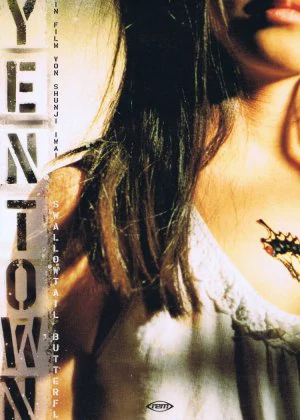Swallowtail Butterfly
Movie details

For fans of Japanese cinema, Shunji Iwai is a household name. He made a couple of great films around the turn of the century and even managed to grab some international mindshare during the early 00s, but it wasn't quite enough to uphold a stable, international career. Swallowtail Butterfly [Suwarôteiru] is an early Iwai and far from his most typical one, but it is one of the films that made me fall in love with his work. It's been ages since I last watched it though and I remembered fairly little of it, so I was curious to see how well it would hold up after all these years.
![screen capture of Swallowtail Butterfly [Suwarôteiru]](/thumbs/img/articles/1200xauto/swallowtail-butterfly-1.webp)
Iwai is best known for his delicate teen angst dramas. You could call him a live action Hideaki Anno, only without the extreme genre overtones. Iwai's popular work tends to be quite soft-voiced and sweet, though rarely without a darker edge present. Swallowtail Butterfly has none of that though. It's a raw, wild and often uncontrolled film that tears apart popular genre cinema conventions and leaves behind a wonderful mess of a film. It has all the markings of the work of a young director, still looking for his own style and signature, yet overflowing with energy and passion.
Trying to categorize Swallowtail Butterfly is no easy task. The setting is an alternative near-future where the Yen has become the dominant currency, with a strong focus on slum life (i.e. the places where immigrants are gathering to get their piece of the cake). It's a pretty dystopian setting, though it doesn't feel like typical sci-fi. Not in the least because the film presents itself more like a drama, following a young girl's attempts to carve her own path. The structure is almost that of a road movie though, with each stop diverging into different genre territories and highlighting different parts of this world.
When Ageha's mom dies, she is offered to Glico, together with a lump sum. Glico is desperate for money and agrees to take care of Ageha, though reluctantly. The slums are a tough place to grow up, but when one of Glico's friends ends up buying an old bar, their luck finally changes. The place is a success and Glico quickly becomes a local sensation. When she is scouted by some bigwig music producers though, the group quickly falls apart and everyone is left to fend for themselves.
![screen capture of Swallowtail Butterfly [Suwarôteiru]](/thumbs/img/articles/1200xauto/swallowtail-butterfly-2.webp)
Rather than try to create a truly futuristic setting, Iwai goes for a more attainable Kowloon-like dystopia. It's different enough from modern-day Japan to get its point across, and it doesn't have to rely on (expensive) CG to make an impact. The camera work is a lot more aggressive and agile than what I'm used to from Iwai, but it suits the setting and gives the film that extra boost of energy. There are still some beautiful shots and moments of peaceful tranquility, only fewer and farther between. Overall the cinematography can be a little rough, but Iwai did very well to make that part of the charm.
The soundtrack is vintage Iwai. A bit more punk than what you might be expecting, but the way he works the music into his films is nothing less than exemplary. Rock music may not be my thing, but it's very much part of the fabric of the film. The rest of the soundtrack is more in line with Iwai's other films, somewhat pop-inspired, but always fitting and used in just the right way. It's not a soundtrack I'd listen to outside the context of the film, nonetheless it's a real asset that makes Iwai's films that much more enjoyable.
The actors also did a terrific job. Not the biggest names in Japanese cinema, but Iwai knows how to draw the most from his cast. Chara and Ayumi Itô form a superb duo and have no trouble carrying this film between the both of them. There are also some very fine performances from the supporting cast, most notably Mickey Curtis, Andy On and Hiroshi Miami, and some nifty cameos of Tomorô Taguchi and Tadanobu Asano. The cast is rather large though and not everyone is up to par, but the middling performances are limited to passing characters only.
![screen capture of Swallowtail Butterfly [Suwarôteiru]](/thumbs/img/articles/1200xauto/swallowtail-butterfly-3.webp)
Swallowtail Butterfly is a pretty chaotic film. While there is a clear narrative, the film often deviates from it and introduces many subplots, not to mention characters who merely swing by without being thoroughly explored. This is by design though. The film is more interested in serving up an impression of a world rather than a clear-cut narrative, and chaos is inherently part of this world. As a viewer, you're supposed to feel a little lost and overwhelmed, drifting along with the main cast and experiencing whatever comes their way. It's a choice that really paid off for me, but won't be to everyone's liking.
If you take a closer look at Iwai's oeuvre, you'll notice that he's actually made quite a few outliers, so it's not as if Swallowtail Butterfly is Iwai's one moment of rebellion and/or madness. It's a film like no other in his repertoire though. An ambitious, raw, vibrant and energetic gem, sporting fine cinematography, a great soundtrack and some stand-out performances that all help to give birth to a unique universe. It's not a blind recommend for Iwai fans, but if you love off-beat and distinctive Japanese cinema, it's a must-see.